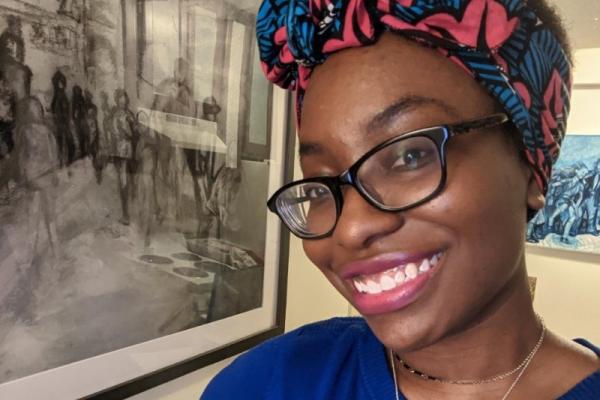
Dr. Ebony Bailey
(John Wilmerding Digital Interpretation Intern at the National Gallery of Art, OSU Alumna - Department of English)
In this talk, I return to the past of American Folklore Studies to identify both the process by which Black people were represented as the folk (i.e., how Black people were viewed, documented, and discussed) and recognize African American writers, activists, and folklorists who intervened in these processes to assert their humanity and culture. I will discuss how African Americans were pivotal to the beginnings of American folklore studies. They were not simply subjects for folklore studies; as scholar Shirley Moody-Turner has said, they were “active participants” in defining “the folk” and collecting folklore. Since “the folk” were repeatedly equated to Black Americans and folklore was used as a measure of African Americans’ post-emancipation “progress,” nineteenth-century African Americans recognized nineteenth- and twentieth-century folklore as a key site in shaping Black representation.
Along with recognizing these contributions, I will discuss the importance of revisiting the origins of American folklore studies – today, more than ever, it is important to understand the construction and stereotyping of Blackness that so definitively characterized the beginnings of American folklore studies.
Currently, Dr. Ebony Bailey is the John Wilmerding Graduate intern in digital interpretation at the National Gallery of Art. At the Gallery, she works with the department of interpretive resources to develop digital and in-person stories that engage Gallery visitors. She recently received her doctorate in African American Literature from The Ohio State University. During her graduate studies, she studied folklore and narrative theory in African American literature, examining how African American authors developed narrative techniques and incorporated folklore into their literature.
While at Ohio State, she also served as an intern for the Shumate Council for African American Outreach and Engagement at the Wexner Center for the Arts. She identified how art educators use stories to connect to different audiences, and she worked to support the Shumate Council’s goal in fostering African diasporic contemporary art at the Wexner Center for the Arts.
Register in advance for this meeting:
https://osu.zoom.us/meeting/register/tJUoc-2qrz0pHNCkMpPH3Xfq9sb7m3p1C6VI
After registering, you will receive a confirmation email containing information about joining the meeting.
This event is co-sponsored by the Department of African American and African Studies. This event is FREE and open to the public.
If you require an accommodation such as live captioning or interpretation to participate in this event, please contact Cassie Patterson at Patterson.493@osu.edu. Requests made two weeks before the event will generally allow us to provide seamless access, but the university will make every effort to meet requests made after this date.
